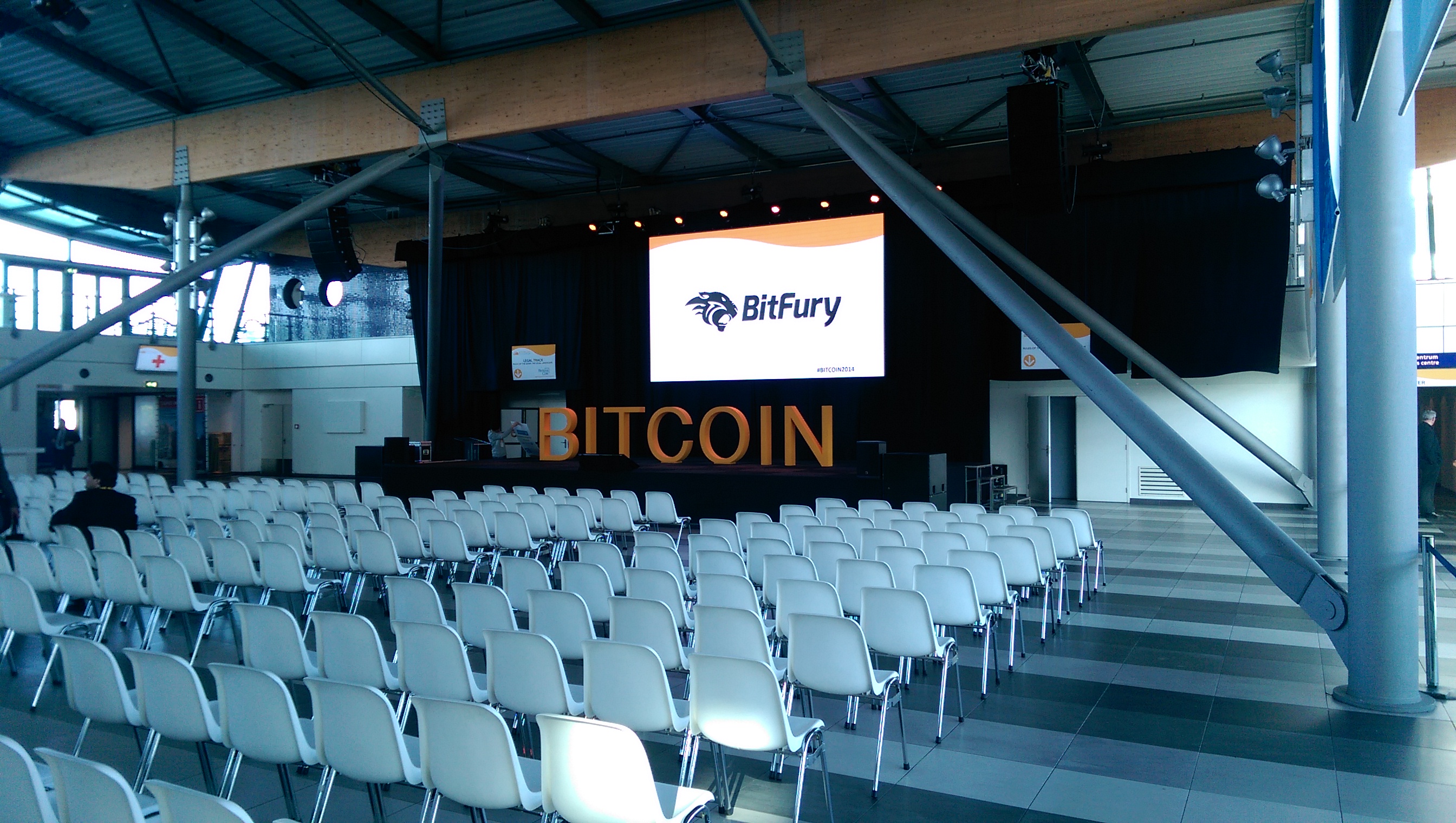So, I’m sitting here early on a sunny Sunday morning in a great little coffee shop in Amsterdam (no, not one of those ones…) and reflecting on the last three days of Bitcoin 2014.
It’s been an exhilarating few days. I’ve never been to an event like it, where the sense of an impending global revolution sits side-by-side with philanthropy and open entrepreneurial passion for building new businesses. It’s a strange world where all three can sit together within one format and there’s no doubt that this is one of few places. OK, so the crypto-anarchists were never going to be hugely satisfied with a conference that was ‘industry’ rather than ‘grass roots’ but to me it’s pretty simple.
The fact is that Bitcoin – and other decentralised systems – are coming. There is inevitably going to be a period of significant disruption ahead and it’s important for everyone who has realised this fact to help others to understand more about this train that’s a-coming. For some people, that does involve engaging actively with individuals, local and national businesses and politicians to ensure that they aren’t blinded by the poor level of information that’s currently available. The level of general public awareness is still woefully low and that needs to change fast.
There’s no way that I do the entire conference justice in a single blog post but there were a few things that stand out.
Bitcoin in the Developing World
- Check out this new film that was premiered at the Conference. I banged on about the global remittance market in my TEDx talk on Bitcoin and this video does a great job in explaining precisely why Bitcoin is so important for the developing world.
Patrick Byrne Keynote

I’m not sure what can be said about Patrick Byrne’s keynote at Bitcoin 2014 that can do it justice. That guy must have a brain the size of a small planet. The Scourge of Wall Street gave a whistle-stop tour through Western philosophy and explained why a society based on cryptographic principles is not only the answer but a necessity. Denounced at one stage as a lunatic, proved right by the subsequent financial collapse in 2008, I challenge anyone to criticise the obvious passion of someone who has gone so doggedly out of his way and against the grain in his mission to expose the corruption within our current financial systems (particularly within the US). And all whilst running a billion dollar company (that of course now accepts Bitcoin and is on course to hit $10-15 billion in Bitcoin revenue in 2014).
Importantly, Byrne divulged that the business is now trying to hold 10% of revenue in Bitcoin (as opposed to cashing out immediately into dollars). And it’s precisely because of this sort of commitment, where businesses such as Overstock are now encouraging their suppliers in turn to accept Bitcoin in payment, that will help usage to spread through the business ecosystem. And that’s before we even get into his plans to dual-list the business on a “blockchain kind of stock exchange” itself….
User-friendly Wallets
- We’ve been talking about the desperate need for a user-friendly Bitcoin wallet service for a long time now. And on Day 1 of the Conference, with the launch of Circle.com, we’re arguably as close as we’ve ever been. The business has been in stealth for a while despite raising $26 million. It’s invite-only but watching Jeremy Allaire demo Circle in the flesh, I have to say I’m impressed. This isn’t Bitcoin for people who know about it already. This is a mass market play for everyone’s attention. Your wallet connects directly to your bank account, money transfers instantly between dollars (initially) and Bitcoin at will, with a zero exchange fee and – crucially – it’s all fully insured. This could very well be the first Bitcoin interface that your mum just *understands*.
Bitcoin ATM’s
- Amongst the range of ATM’s on display, I finally got the chance to give the Lamassu Bitcoin ATM for the first time. I converted a 10 Euro note into my Bitcoin wallet in under 60 seconds. Faultless experience, no ID required and a highly impressive piece of kit.
Annual State of Bitcoin Address
- For Chief Scientist Gavin Andresen, 2014 is the year of multi-sig wallets. As for 2015, the prediction is that Bitcoin will be bigger (and better-looking), more secure, more diverse, more mainstream, more regulated and less volatile. Plenty more info in the talk which will be online soon.
Mike Hearn Builds a Lighthouse
- Always a fantastic and knowledgeable speaker, Mike has built an app called Lighthouse to implement Bitcoin’s built-in decentralised crowdfunding function. Check out more details on his blog post here.
Blockchain.info Awards
- Great to see the Lets Talk Bitcoin podcast win the best podcast category at the first Blockchain Awards. Definitely my go-to listening podcast on anything to do with the subject. And as you’ve probably heard, Andreas refused to accept his award. Although clearly the most popular winner at the event was Satoshi Nakamoto himself who turned up in person before disappearing mysteriously into the Amsterdam night….(it wasn’t Gavin dressed up, honest…)
The Bitcoin Foundation
- First of all, Jim Harper seems like a real asset to the Foundation in my view. Eloquent and knowledgeable from the panels I saw him on, he’s also written a report that’s well worth checking out on ‘Removing Impediments to Bitcoin’s Success: A Risk Management Study”.
- I went along to the Bitcoin Foundation Annual Members’ Meeting straight after the conference. It’s fair to say that the Foundation comes in for a huge amount of criticism from the Bitcoin community and the days leading up to the event were filled with various critical stories in the press. But I have to say that having been there and looked the guys in the eyes, the picture’s nowhere as simple as is commonly made out.
- There’s obviously a perception within Bitcoin-land about what the Foundation is and should do. They have fallen short in a number of areas of course but I honestly believe that the majority of that comes down to two things. Firstly, there is a mistaken assumption by the Bitcoin community that the Foundation should be representing the disparate goals and interests of each group that is interested in Bitcoin. Secondly, and no less importantly, the Foundation is an organisation that is under two years old and has been woefully under-resourced in a year in which Bitcoin awareness has both exploded and simultaneously been attacked from all sides.
- Going from only 3 full-time staff to 10 in the past year, the reality (which hasn’t been communicated effectively) is that they are there to represent their members – not primarily the community itself. 70% of their funding comes from their corporate membership. Let’s be realistic about what they can achieve – but let’s also not be naive about where an organisation like that can be most effective with the limited funding that they have, focusing their time and efforts on the bigger picture by helping businesses, individuals and politicians to properly grasp the concepts of Bitcoin. Let’s hope the international affiliate chapters go some way to dealing with the issue and communication improves.
Anyway, so much more to say but this post is already way too long and bluntly, it’s not supposed to be about the politics of the Foundation themselves. So – if there’s one takeaway from the conference, it’s this:-
Bitcoin is growing. Adoption will come. The people who are working to bring this new technology to the world and are amongst the most clever and intelligent that I’ve ever had the privilege to speak with and there are increasing numbers flocking to get involved in the area. And where else do you have the chance to get involved with a technology that is going to change the world for the better whilst creating opportunities for so many? If you want to learn more, get in touch. Come along to one of our Bitcoin Meetups in Edinburgh.
Let’s keep the conversation going. See you in Asia for Bitcoin 2015?
















